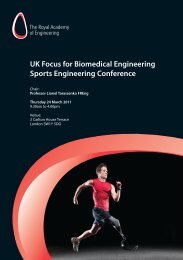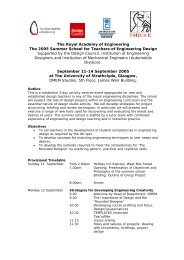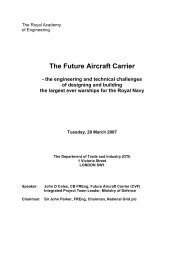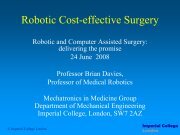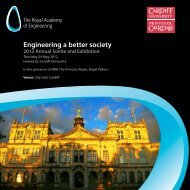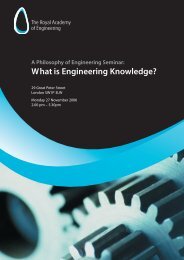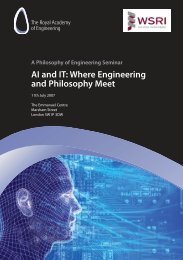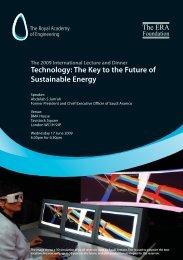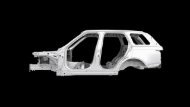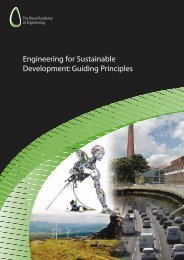Engineering Ethics: Do engineers owe duties to the
Engineering Ethics: Do engineers owe duties to the
Engineering Ethics: Do engineers owe duties to the
You also want an ePaper? Increase the reach of your titles
YUMPU automatically turns print PDFs into web optimized ePapers that Google loves.
The Lloyd’s Register Lecture<br />
One of <strong>the</strong> earliest examples of intervention or amicus curiae in <strong>the</strong> field of <strong>Engineering</strong> occurred in <strong>the</strong><br />
celebrated case of Holger Hjortsvang v San Francisco Bay Area Rapid Transit District, 67 brought in <strong>the</strong> State<br />
Court of California. The US Institute of Electrical and Electronics Engineers (IEEE) was granted leave <strong>to</strong><br />
file an amicus brief on behalf of three Engineers who were sacked for "whistle blowing". The plaintiff, with<br />
two colleagues, had expressed concerns about <strong>the</strong> safety of <strong>the</strong> Rapid Transit System <strong>to</strong> <strong>the</strong> Board. Their<br />
concerns were dismissed, but not long afterwards, a BART train malfunctioned because of <strong>the</strong> problem<br />
pointed out by <strong>the</strong> Engineers, and overran a station, injuring passengers. The Engineers brought<br />
proceedings against <strong>the</strong>ir former employer in which <strong>the</strong> IEEE intervened. The petition <strong>to</strong> <strong>the</strong> Court stated<br />
that:<br />
"California Courts recognise this principle and discretion should be liberally applied <strong>to</strong> favour Amicus<br />
Curiae intervention. The Court has broad discretion <strong>to</strong> permit <strong>the</strong> filing of an Amicus Curiae brief…because<br />
IEEE has a particular expertise with respect <strong>to</strong> Engineers’ obligation <strong>to</strong> provide public safety".<br />
The case settled and shortly afterwards <strong>the</strong> IEEE set up a formal amicus curiae review mechanism whereby<br />
Engineers could request <strong>the</strong> IEEE <strong>to</strong> file an amicus brief in a particular case when an ethical question was<br />
raised. 68 This procedure is now provided for in <strong>the</strong> Institute’s Policy and Procedures Manual, which<br />
provides that <strong>the</strong> amicus statements submitted <strong>to</strong> <strong>the</strong> Court will be those judged "<strong>to</strong> be objective,<br />
verifiable and properly coming within <strong>the</strong> purview of <strong>the</strong> IEEE". 69 After over twenty years in operation,<br />
twenty-three amicus requests have been made <strong>to</strong> <strong>the</strong> IEEE under this mechanism, but for varying reasons<br />
(including settlement) none of <strong>the</strong>se requests have led <strong>to</strong> <strong>the</strong> filing of amicus briefs in ethical support<br />
cases. Even so, <strong>the</strong>re is much <strong>to</strong> learn from IEEE’s experience.<br />
After more than two decades following <strong>the</strong> BART case, experience in <strong>the</strong> USA has seen a blurring of <strong>the</strong><br />
line between intervener and amicus, coupled with an exponential increase in <strong>the</strong> use of such briefs. This<br />
was <strong>the</strong> impetus behind several Federal and State Courts prescribing <strong>the</strong> manner in which such briefs<br />
were <strong>to</strong> be submitted. At <strong>the</strong> Federal level in <strong>the</strong> United States, <strong>the</strong> amicus practice is now regulated by<br />
procedural rules which require that private entities and individuals seeking <strong>to</strong> participate in a case as<br />
amicus curiae must ei<strong>the</strong>r gain <strong>the</strong> consent of all parties or, if such consent is refused, file a request with<br />
<strong>the</strong> Court which describes <strong>the</strong> applicant’s interest in <strong>the</strong> case and whe<strong>the</strong>r any portion of <strong>the</strong> brief was<br />
authored or funded by a party. 70 This separation of <strong>the</strong> lobbyist brief from <strong>the</strong> true amicus brief is now<br />
essential when it is considered that amicus filings before <strong>the</strong> United States Supreme Court have increased<br />
eight-fold in <strong>the</strong> last fifty years and that amicus briefs were filed in over 85% of all Supreme Court cases in<br />
<strong>the</strong> period 1985 <strong>to</strong> 1996. 71<br />
There is, as yet, no similar development within <strong>the</strong> UK, which is still at an early stage in considering <strong>the</strong><br />
usefulness of amicus briefs in aid of <strong>the</strong> maintenance of ethical standards. The experience from <strong>the</strong> USA<br />
indicates that caution will be required when seeking <strong>to</strong> establish appropriate procedures and that <strong>the</strong>re<br />
will be a need <strong>to</strong> distance true ethical considerations from <strong>the</strong> interests of pressure groups.<br />
<strong>Ethics</strong> in o<strong>the</strong>r roles of <strong>the</strong> Engineer<br />
The inquiry thus far has concentrated largely on health and safety and environment issues arising in <strong>the</strong><br />
course of <strong>the</strong> Engineer’s normal advising role, where it has become evident that many different ethical<br />
issues can arise. While this paper has already become over-long, <strong>the</strong> opportunity <strong>to</strong> comment on <strong>the</strong><br />
67 Walter Elden, Curtailing Ethical Harassment, on <strong>the</strong> IEEE website at http://caffeine.ieee.org/INST/feb96/ethics.html.<br />
68 Walter Elden, IEEE’s Member Conduct Committee – 20 Years of Operation at<br />
http://www.spectrum.ieee.org/INST/feb98/conduct.html.<br />
69 IEEE Policy and Procedures Manual 7.13 Preparation and Filing of Amicus Curiae Briefs at<br />
http://www.ieee.org/about/whatis/policies/p7-13.html.<br />
70 SUP.CT.R.37 and FED. R.APP. P.29. Many of <strong>the</strong> State Courts in <strong>the</strong> United States also have rules permitting <strong>the</strong><br />
submission of amicus requests. H<strong>owe</strong>ver, <strong>the</strong> rules vary and in some cases are much more restrictive than Federal Court<br />
practice. For a sampling of State Court practice, see Nancy Bage Sorenson, ‘The Ethical Implications of Amicus Briefs’<br />
(1999) 30 St. Mary’s LJ 1219.<br />
71 Joseph Kearney, ‘The Influence of Amicus Curiae Briefs on <strong>the</strong> Supreme Court’ (2000) 148 U.PA. L. REV. 743, 752 – 753<br />
18 The Royal Academy of <strong>Engineering</strong>





